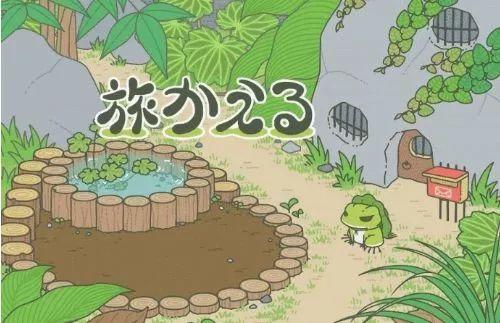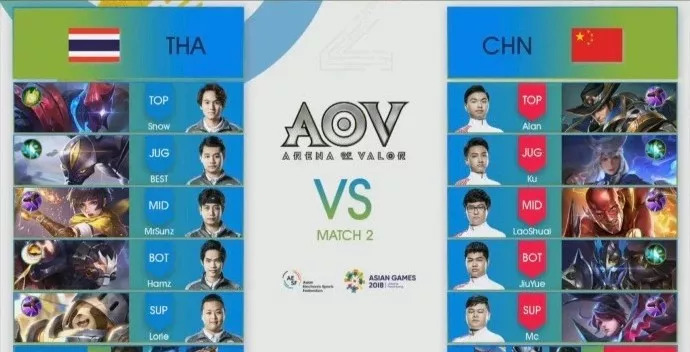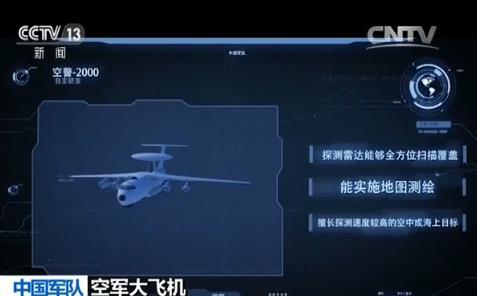
CCTV News:On November 26th, 26 years ago, China philosopher Feng Youlan passed away. Referring to his 80-year reading experience, Mr. Wang pointed out: choose carefully, explain what he said, know what he meant, and understand what he said. "Books are not full of words, but words are not full of meaning". Reading means reading a dead book alive, and getting its "overtones and flavors" so that the book can be used by me. This is considered reading and reading home. Through the years, learn from your husband, and then look back on your reading habits. I wonder if you will suddenly be enlightened.
My reading experience
Author/Feng Youlan
I am 87 years old this year. I have been studying since I was seven years old, and I have basically never stopped. I can’t say that I have no experience in reading. Most of the books I read are about literature, history and philosophy, especially philosophy. My experience can be summed up in four points: first, choose carefully, second, explain what it says, third, know what it means, and fourth, understand what it means.
A "classic work" handed down by a careful selection and time test of reading classics.
Say first.The first point. Ancient and modern, Chinese and foreign, the accumulated books are really multipolar and vast, but although there are many books, there are still a few that have permanent value. Books can be divided into three categories, the first category is for intensive reading, the second category is for extensive reading, and the third category is for browsing only.

The so-called intensive reading means reading carefully and word by word. The so-called extensive reading means that you can read it carelessly, as long as you know what it is about. The so-called leafing means not to read word by word, not to read sentence by sentence, and not to read page by page. Just like reading a newspaper, you can flip through the headlines, glance at the places you feel interested in, and flip through the places you don’t.
I heard that when there were newspapers in China, some people held newspapers and read them aloud word by word, just like reading the Five Classics and Four Books. According to this method, you can’t finish reading a newspaper in one day. Most books, like the news in the newspaper, may be sensational, but they are short-lived and soon pass.Therefore, although there are many books, there are not many that really deserve intensive reading.. The following refers to books worthy of intensive reading.

How do you know which books are worth intensive reading?? There is no need to worry about this problem. Since ancient times, there has been one of the most impartial reviewers, and many recommenders have recommended good books to it. This choice of home is time, and these recommenders are the masses. The masses have always recommended books that they think are valuable to time. Time, according to their recommendation, brushed away all the books with no permanent value and handed down the books with permanent value. Books handed down from ancient times have been recommended by the masses and handed down through the choice of time.
We saw that most of the books handed down from ancient times were valuable, and we wondered why everything written by the ancients was valuable. In fact, this is not surprising. There are many worthless things they have made, but these worthless things have not been recommended by the people of all ages. Under the test of time, they have been rejected and brushed away.
At present, the books we call "classic works" or "classic works" have been handed down through the test of time.. This kind of books are all books that should be read intensively. Of course, with the passage of time and the development of history, some of these books will be brushed down. But until now, they are all on the list, and we can only look at the current list.

Second, interpret his words and break through the language barrier.
weWith this number in mind, you can choose some books to read intensively with your major. This is to read one book at a time, so you can only read one book at a time, and you can only read the second book after reading one book. When reading, you should first interpret the words. That is to say, we must first understand its words; Its words are its language.
There are differences between Chinese and foreign languages and between ancient and modern languages. Generally speaking, Chinese in China includes modern Chinese and ancient Chinese, which are collectively called ancient Chinese. In detail, there are different times in ancient prose, such as ancient prose in pre-Qin dynasty, ancient prose in Han dynasty, ancient prose in Wei and Jin dynasty and ancient prose in Tang and Song dynasties.
The ancient books of the Han nationality in China are all written in these different ancient texts. These ancient writings are all written in ordinary Chinese characters, but it is not enough to know only Chinese characters. We can’t understand the books written by the ancients in ancient Chinese, and the ancients won’t understand our People’s Daily now. This is called the language barrier. If you can’t break this pass, you can’t see what’s going on inside this pass, and you don’t know what’s inside, so you have to tell others what to do outside the pass. That’s no good.

What I am talking about is to break through this language barrier. Of course, when we attack this barrier, we must make a lot of preparations and use many tools, such as dictionaries and reference books. This is a matter of course, so I won’t talk about it here.
Third, knowing its meaning, we can get its "overtone, taste outside" and experience its spiritual essence outside the text.
ChinaThere is an old saying that "the book is not full of words, and the words are not full of meaning." It means that what is written in a book is always less than what the person who wrote that book has to say, and what he says is always less than what he wants to express. What is written in a book is always simpler, and you can’t be as verbose as what he has to say. There is a way to overcome this. As long as he is not afraid of nagging. Fortunately, pen, ink and paper are very cheap, and it is nothing more than wasting a little more pen, ink and paper to write a long article, which is not a great thing. But there is no way to overcome the difficulty of not saying enough. Because language is always inseparable from concepts, concepts are never completely appropriate for specific things, but they are just a big outline.
For example, a person said that he had a toothache. Tooth is a concept, pain is a concept, toothache is a concept. In fact, he didn’t stop at a toothache. That pain, there is a special pain method, with a certain size range and a certain depth. These are all very complicated situations, which can’t be clearly explained by just the word toothache. No matter how much he bothers, he can’t say it. That’s the difficulty of expressing it beyond words.

Therefore, when reading, even if you know all the words in the book and understand all the words, you may not know the meaning of the person who wrote the book. Once upon a time, people said that reading should pay attention to between the lines, and that reading poetry should have its "overtone, taste outside." This is all about understanding its spiritual essence outside of words. This is knowing what it means.
Sima Qian once said, "Those who are eager to learn and ponder know what they mean." Meaning is inseparable from language, but some words can’t fully express it. If it is limited to the language, it will become a dead study if you cling to the language. People who study hard are nerds. Language is a crutch to help you understand the meaning of books. Now that you know what that means, you’d better throw away the crutch. This is what the ancients called "forgetting words with pride".In the relationship between people, it is immoral to kick down the ladder. However, in reading, it is necessary to kick down the ladder..

Four clear reasons, only by "six meridians note me" can we really "note six meridians".
aboveUnder the words "the book is not full of words" and "the words are not full of meaning", you can add another sentence "the meaning is not reasonable". Reason is an objective truth; Meaning is the subjective understanding and judgment of the writer, that is, the subjective reflection of objective truth. Since reason and meaning are subjective and objective, they cannot be completely consistent.
People are always people, not omniscient and omnipotent. There is always a gap between his subjective reaction, experience and judgment and objective truth, and there are big or small mistakes. Therefore, it is not enough to read only to get the meaning, but also to understand the reason, so as not to be mistaken by the meaning of the predecessors.
If I understand it clearly, I will have my own ideas. My meaning is of course subjective. It may not be completely objective. But I can compare, complement and correct my ideas with those of my predecessors. It is possible to get a more correct meaning.
This meaning is mine, so I can use it to handle affairs and solve problems. It’s as if I walk on my own legs. As long as I want to walk in my heart, my legs will naturally go. Reading to this extent means that you can learn and use the book alive.

Those who can read can read dead books alive, while those who can’t read can read living books to death. If I read a dead book alive, I can use it for me, and if I read a living book dead, I can use it for me. If you can use books instead of books, you will read home.
Someone once said, "Six Classics Note Me, I Note Six Classics". I understand those objective truths, I have a meaning, and I take the meaning of my predecessors as a reference. This is the "Six Classics Notes on Me". I don’t understand those objective truths, and even didn’t get all the meaning of the ancients, but only scrutinized the language, that is, "I note the six classics." Only by reaching the level of "six meridians note me" can we really "note six meridians".
Sketch ● Feng Youlan
"Make a heart for heaven and earth, make a life for the people, carry forward the past and learn from the past, and create peace for all generations" [motto]
Feng Youlan, a modern philosopher, thinker and educator in China, was born in tanghe county, Henan Province. In 1915, he was admitted to the Philosophy Department of China, Peking University, and went to Columbia University to study philosophy in 1919. In 1923, he passed the defense of his doctoral thesis with the article "A Comparative Study of Life Ideals" and obtained a doctorate in philosophy. In the same year, he returned to China and served as Dean of Tsinghua University and The National SouthWest Associated University College of Literature.
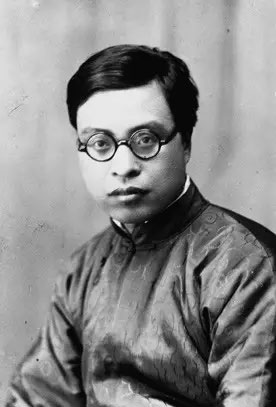
△ Youth Feng Youlan
In 1934, his book The History of China’s Philosophy was published simultaneously by the Commercial Press. When War of Resistance against Japanese Aggression broke out in 1937, Feng Youlan moved south with Tsinghua University. On the way to the south, I began to conceive and write "Six Books of Zhenyuan" (New Neo-Confucianism, New Things, New World Training, New Primitive Man, New Original Road and New Knowledge). These six books were all completed in the period of The National SouthWest Associated University, representing Feng Youlan’s whole philosophical system.
He was deaf in his later years and described himself as "stupefied". After 1978, at the age of over 80, he began to revise the New Edition of China’s Philosophy History. Later, he became blind and continued to dictate the last two volumes of China’s New History of Philosophy. In 1990, the eight-volume New Edition of the History of China’s Philosophy was completed and published.
His lifelong career can be summarized as "Three Histories Interpreting the Present and Six Books Disciplining Zhenyuan", and he has become one of the philosophers who can establish a philosophical system in China in modern times with his works such as History of China’s Philosophy, A Brief History of Chinese Philosophy, New Edition of the History of China’s Philosophy and Six Books of Zhenyuan. On November 26th, 1990, Feng Youlan died in Beijing due to illness at the age of 95.
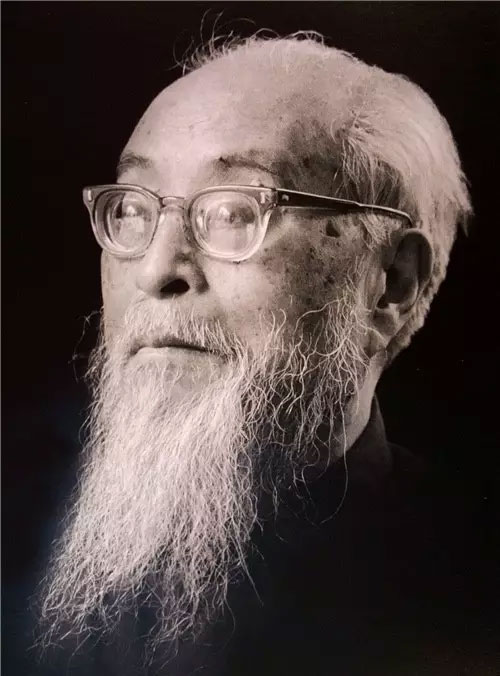
Nowadays, Feng Youlan has gradually drifted away, but his academic spirit, life experience and contribution to China’s philosophy are always new topics.
Is life meaningful? Feng Youlan replied, if we can understand life, life will be meaningful, if we can’t understand life, life will be meaningless. Everyone has different understanding of life, so there are differences in the realm of life. He divided the realm of life into four levels: (1) Natural realm; (2) utilitarian realm; (3) moral realm; (4) the realm of heaven and earth. The first two are natural products, while the latter two are spiritual creations. "If someone can live in the moral realm, he is a sage, and if he can live in the realm of heaven and earth, he is a saint."
